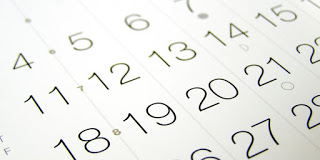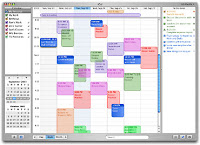Some might say that our life is made up of squares – lots of them. We fill them in with appointments and work and events. Some of us fill up every square and others of us try and leave as many of them as possible empty.
 When talking about simplifying our life, we can’t really get too far into the conversation before mentioning our calendars and schedules. Our lives move forward (time wise) with every passing minute, hour, day and week. We can plan those minutes well or let them slide by into the past, never to be used again.
When talking about simplifying our life, we can’t really get too far into the conversation before mentioning our calendars and schedules. Our lives move forward (time wise) with every passing minute, hour, day and week. We can plan those minutes well or let them slide by into the past, never to be used again.
We are so busy!!! At least that’s what we tell ourselves and others. Isn’t funny when we’re asked how we’re doing, the most common answer is, ‘I’m so busy’. It’s almost like we’re bragging. You hardly ever hear someone say, ‘life is great, I’m really finding my rhythm, I’m experiencing a good balance between home and work and play, can’t really complain.’ What a boring answer right? One writer says when we respond without thought with ‘I’m busy’ that it feeds something unhealthy in us.

There are two approaches to time, we either use our calendar to help us steward our time or we let other things and people control how we use (and lose) our time. What if we saw our calendar as the primary tool to help us become who we want to be; more importantly, who God wants us to become.
In Ephesians 5, Paul says these words about time and opportunity, “Be careful then, how you live, as wise and not unwise, making the most of every opportunity.” What’s he getting at? Be thoughtful how you invest your time, your days, your lives. In light of this verse, we can ask one simple (or not so simple) question, ‘What if God were in charge?’ Bill Hybels says, ‘the thoughtful arrangement of your daily and weekly calendar is one of the holiest endeavors you can undertake.’ and ‘our schedule is far less about what we want to get done, and more about who we want to become.’
Let’s be honest, our schedules are very connected to our character and personality. We approach things by the way we’re wired. Some of us are morning people, some night people, some of us need naps, others not much sleep. Historical figures are great examples of this. Many of them worked within strange schedules, but it worked for them. One thing is for sure, our calendars need to match up with our values; with who we want to become. Jesus was the best example of this. Gordon MacDonald puts it so well; he says Jesus’ schedule was dictated by three things:
1) he understood his mission (Luke 19:10)
2) he understood his own limits (Mark 1:35)
3) he took time to invest in others
It’s in scarce supply and
must be used wisely.
Ask yourself this, what will it take or what does my schedule have to look like to be…
– a better friend
– a better spouse
– a better parent
– a good neighbour
– an awesome employee
– a better follower of Jesus
In order for us to become who God wants us to be we have to consider a few things in regards to our schedule.
Get the important stuff in first.
We’ve all heard the metaphor about the Mason Jar, the one about getting the big rocks in before you add the small rocks and pebbles. As old and worn out as that illustration is, it’s still very true. If we don’t plan to pray or to read or to spend time with family or to get the education we need, it may never get into our overwhelming schedule.
Fill the squares with words that reflect your plan and your purpose.
John Grisham, before he was known for his novels, was a lawyer. John had a dream to be a writer, so he included the word ‘WRITE’ in the hour square just before his work day started. He would go into work an hour early to write. He stuck to this schedule, and wouldn’t you know it, he became one of the most popular novelists of the late 90’s and 2000’s.
What words need to get into your calendar so they become sacred to you? READ, PRAY, FAMILY, HOME, RUN, DATE NIGHT, etc?
Make room to hear God’s whisper in your life.
Both Bill Hybels and Tony Campolo start their day with prayer. Hybels describes it as rolling out of bed and onto his knees. Campolo says he simply lays in bed for the first 20 minutes and prays. Are you making room for this in your life? If you want to know God more and desire that your life looks more like the life of Jesus, I’d suggest you make time for prayer and scripture. No other way to say it.
If you want to be intentional about your calendar being a tool to help you become who God wants you to be, here’s a final suggestion of what you should consider as non-negotiables to fill some of the squares in your life:
church, a few minutes a day of reading and
prayer, small group, …
date night, play night, movie night, vacation, …
a plan to get better, to get ahead, to network
more, etc…
“Be careful then, how you live, as wise and not unwise, making the most of every opportunity.”
– – – – – – – – – – – – – – – – – – – – – – – – – – – – –
small(er) group discussion:
When you think of your calendar what words come to mind?
When you’re asked how you are doing, do you find yourself often responding with, “I’m busy” or a similar phrase? Why? How does it make you feel?
Take time to read Ephesians 5:15. Does this challenge you in any way? If so, how?
What are some squares in your life that need rearranging? Which ones may have too much value? Which ones may have too little value?
Do you have prayer or reflection or scripture slotted out on your schedule? Why is it tough for some people to be committed to a few minutes a day?
Pray about being intentional with your time. If certain people in the group share about ways they want to simplify or grow in their time management, pray for that tonight. And pray that we would make time to become who God wants us to be.
